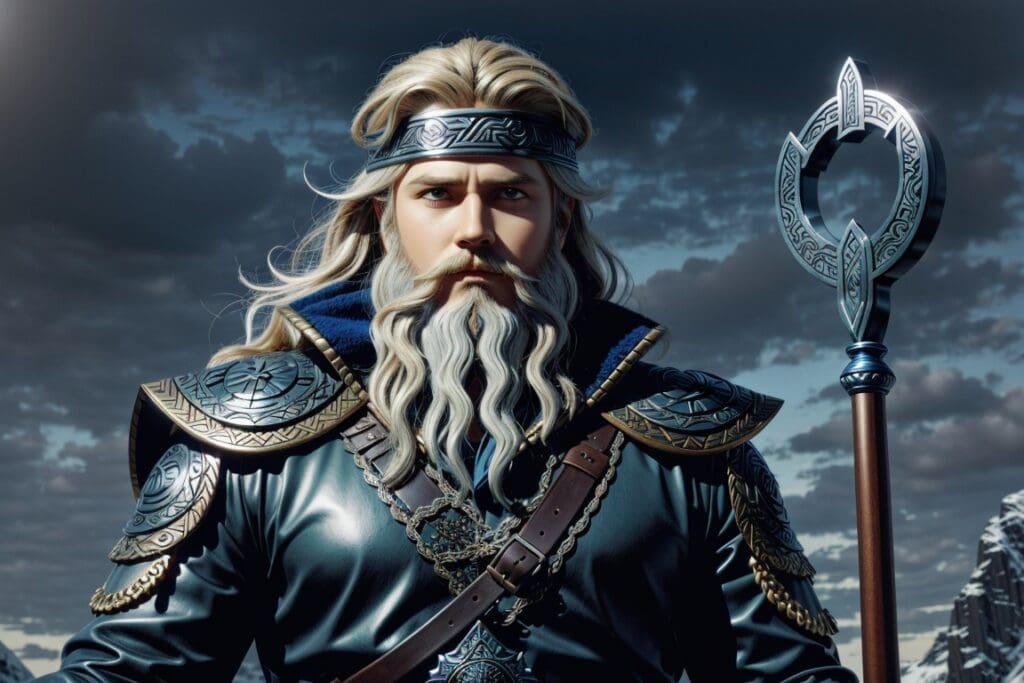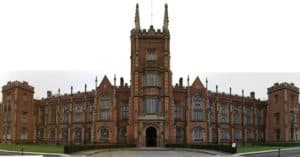The Mighty Odin: God of Wisdom and Healing in Norse Mythology

Updated On: April 24, 2024 by Dina Essawy
Embarking on a journey through the intricate and fascinating realm of Norse mythology is akin to navigating the vast and mysterious corridors of an ancient, mythical world. It’s an experience that is both exhilarating and daunting, rich in complexity and wonder.
The enigma of the mighty Odin, one of Norse mythology’s most revered and complex deities. In this blog post, we will venture together into the depths of Odin’s legend, exploring his multifaceted roles as the god of wisdom, war, and magic. We’ll unravel the tapestry of myths surrounding him and examine his profound impact on Scandinavian culture and beyond.
So, let’s set forth on this captivating journey of mythological discovery. Join me, as we traverse the ancient narratives and unearth the secrets of Odin, the Allfather of the Norse pantheon.
Table of Contents
Who is the Mighty Odin?
The mighty Odin, the god of Wisdom and Healing in Norse Mythology, is an enigmatic figure with numerous functions and attributes.
Overview
Odin is a mighty god in Norse folklore. People respect him a lot in Germanic paganism too. He stands for wisdom and healing, as well as other things like death, royalty, battle, magic and poetry.
Odin leads all the Norse gods. Everyone calls him the All-Father or king of the Aesir. You can tell it’s Odin by his one eye because he gave up an eye to get more knowledge. He knows many things, from war to writing words! Not only that, but Odin also loves learning new stuff! That’s why he went looking for runes or old letters from long ago.
Whether it’s about winning battles or dying bravely – you can be sure Odin has something to do with it! Besides that, this god helps keep our world safe according to Norse stories of how everything came to be.
Because of all this, he holds a high place among Nordic deities and is loved deeply in Scandinavian tales even today.
Functions and Attributes
Odin, the mighty god of wisdom and healing in Norse mythology, has many important functions and attributes. As the leader of the Norse gods, he is known as the All-Father and king of the Aesir.
Odin is a wise deity who values justice, fairness, law, and convention. He is also a seeker of knowledge and is often depicted as an old man with one eye. Odin has many competencies, including war, poetry, healing, royalty, knowledge, and writing.
With his vast understanding of the world, he plays a crucial role in its creation and protection. His complex character and rich mythology make him one of the most significant gods in Norse mythology.
Myths Involving Odin
Odin, the god of wisdom and healing in Norse mythology, is surrounded by fascinating myths that make him a legendary figure. One myth revolves around his pursuit of knowledge and wisdom.
Odin sacrificed one of his eyes to gain immense wisdom, showing his commitment to understanding the world. Another myth portrays Odin as a wise old man who travels through different realms disguised as a seeker.
This highlights his role as a giver of knowledge and guidance to those who seek it. Additionally, Odin is often depicted as an advocate for justice, fairness, and adherence to law and conventions.
Odin in Norse Mythology
Odin in Norse Mythology is a complex and captivating figure, with origins rooted in Germanic paganism.
Origin and Theories
Odin has a fascinating origin, and there are theories about his existence. He is a key figure in Germanic paganism and Norse mythology, with influences from various cultures. Scholars believe that Odin’s character evolved over time through legends and oral traditions of different societies.
His presence can be traced back to ancient Indo-European religions, where he was associated with wisdom and healing. As Norse mythology developed, Odin became one of the central gods in the pantheon, known as the ruler of the Aesir.
Some theories suggest that he may have originated from an older Nordic god or even been influenced by other mythologies. Regardless of his origins, Odin holds an important place in Norse folklore as the wise and powerful All-Father, embodying qualities such as justice, fairness, law, convention, wisdom and healing.
Modern Influence
Odin, the wise and powerful Norse god, continues to have a significant influence on modern culture. His enduring presence can be seen in various forms of media, including books, movies, and video games.
Odin in Literature and Fantasy Novels
In literature, particularly fantasy, Odin often serves as a blueprint for characters that embody wisdom, mystical prowess, and leadership. Modern fantasy novels frequently borrow traits from his persona – the wise yet formidable leader, the seeker of knowledge, or the ruler of mythical realms. His one-eyed visage, a symbol of his sacrifice for wisdom, has become an archetype for characters who bear physical scars in exchange for knowledge or power.
Depictions in Film and Television
In cinema and television, Odin’s influence is unmistakable. He is often depicted as a powerful and sage king, a figure wielding not just physical might but also profound wisdom. This portrayal is vividly brought to life in the Marvel Cinematic Universe, where Odin is portrayed as the ruler of Asgard, embodying strength, wisdom, and moral authority. Such adaptations have brought Odin into the mainstream, making him a familiar figure even to those less versed in Norse mythology.
Video Games and Interactive Media
The realm of video games also frequently taps into Norse mythology, with Odin often featuring prominently. Video game narratives leverage his aspects of wisdom, war, and magic, presenting him in various lights, from a benevolent guide to an omnipotent ruler. Games like “God of War” depict a version of Odin that’s integral to the storyline, drawing players into the rich tapestry of Norse myths.
Influence on Comic Books
Comic books, particularly those from major publishers like Marvel, have reimagined Odin and his kin in the vibrant world of superheroes. Here, Odin is often a character of grandeur and complexity, navigating the realms of godly politics and cosmic battles.

Symbolism and Cultural Impact
Beyond entertainment, Odin’s symbolism resonates deeply in contemporary culture. He represents a pursuit of knowledge, often at great cost, and stands as a symbol of guidance, healing, and moral fortitude. His values of justice and balance find echoes in today’s world, where individuals seek meaning and equilibrium in their lives.
Cult of Odin
Odin has a devoted following, known as the Cult of Odin. These are people who admire and worship this powerful Norse god for his wisdom, healing abilities, and leadership qualities.
The cult is made up of individuals who appreciate Odin’s role in Germanic paganism and value his teachings on justice, fairness, and communal values. They see him as a figure of inspiration and guidance in their lives.
Many members of the cult seek knowledge just like Odin did, striving to gain wisdom and understanding through various means, such as studying ancient texts or engaging in philosophical discussions.
Conclusion
Odin is a revered god in Germanic paganism and Norse mythology. He is known for his wisdom, healing abilities, and leadership among the Norse gods. With his one eye and insatiable thirst for knowledge, Odin represents the pursuit of wisdom and justice in the ancient Norse world.
Through his complex character and diverse roles, he remains an important figure in Norse mythology to this day.
FAQs
1. Who is The Mighty Odin in Norse mythology?
The Mighty Odin, also known as the AllFather, is a one-eyed god of wisdom and healing in Nordic gods from Scandinavian mythology.
2. What makes Odin different from other Norse deities?
Odin stands out amongst all Norse gods and goddesses due to his unique features; he is often depicted as a one-eyed old man accompanied by a raven.
3. Can you tell me more about the raven with Odin?
In the stories of the Norse pantheon, the raven is tied closely to Odin. It represents his power of wisdom and vision over the earth’s realm.
4. Why do people refer to Odin as AllFather?
People call him AllFather as he is believed to be the father to all Norse deities in their rich tales coming down from ages.






